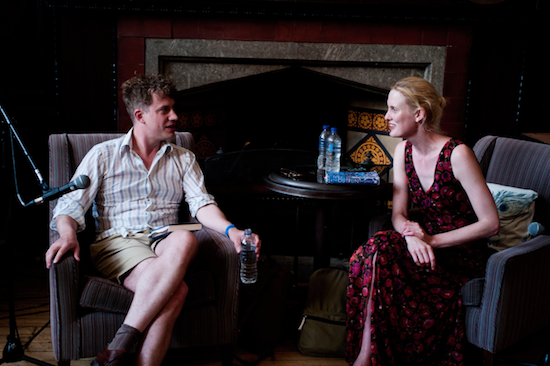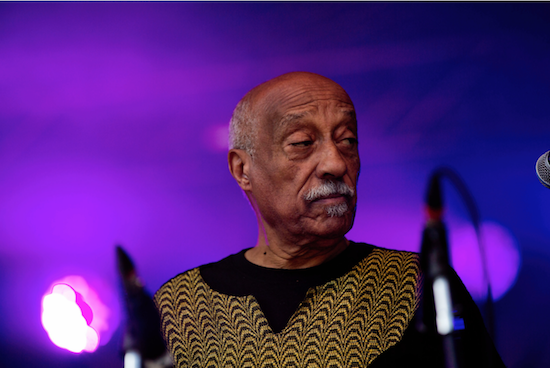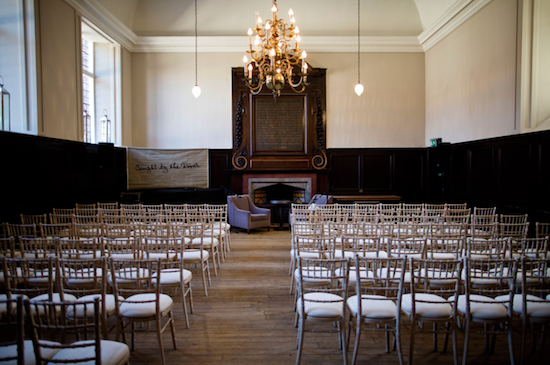The first Caught by the River Thames festival aimed high and largely achieved what it was aiming for. The ever-expanding genre of place writing – split it into the sub-genres of new nature writing, deep topography, psychogeography, nature memoir and landscape punk if you must – was bound end up with it’s own boutique festival, and Caught by the River in many ways are the perfect hosts. They’ve long been championing the links between music and literature in their approach and responses to place, and this hybrid festival seems the way to go.
There’s a hunger for this stuff now, and gathering people like Paul Kingsnorth, Amy Liptrot and Melissa Harrison alongside bands like Low and Super Furry Animals seems like a good idea. Rather than relegating the writers to the sparsely attended literary tent we find at many festivals, here writing and music were given equal billing and that is something to be applauded. The music could have been tailored a bit more to the subject matter of the writing being discussed, but that’s a minor gripe.
You’re either upstream or downriver
In concentrated 45-minute bursts, Iain Sinclair is still pretty much untouchable when it comes to the topics that made him famous. His talk, loosely about the concept of the river – we were by the Thames after all – was an effortless meander through his usual touchstones: London, the work of John Clare, his relationship with Andrew Kotting, creative bits of trespassing, aboriginal cricketers buried in East London and an awful lot more. According to Sinclair, there are two types of Londoner – drawn downriver out into the gloom of the Thames Estuary, or pulled upstream through gentler areas such as Putney and into rural inland England. At his best, his work reinvigorates the world and makes it seem a little bit brighter. I prefer his talks to the 500-page sprawls where the work collapses under its own weight.
On a melancholy note, Sinclair seemed to be suggesting that his work chronicling and charting London is reaching an end. The city has changed and his method for exploring it may be becoming invalid; and it was interesting to see him announce this at a festival celebrating something he very much helped create. Whether the writing and genre he inspired is partly to blame for this change in the metropolitan environment was, sadly, a question left unasked. A good bit of place writing definitely helps add to an area’s cultural capital and surely, then, it’s part of the tangled web of gentrification tangle we’re all stuck in? That’s a discussion I’d go and see. Gary Budden
Chris Packham is an English hero
There’s something deeply satisfying about a public figure who you loved as a child in the 1980s remaining relevant, using their status to achieve good things and annoy the correct people. As a birder, landscape enthusiast and punk fan, Chris Packham is the kind of person I would have tried willing into being did he not already exist. Spotting him walking through the crowd with his Save the Hen Harriers sign and talking with the public was a touching sight on a hungover Sunday afternoon in the blistering heat. Gary Budden
His disarmingly honest onstage interview with Lauren Laverne was an inspiring highlight of the weekend. Discussing a life of Asperger’s, birdwatching, punk rock and, of course, writing his new memoir, Packham really comes across as one of the good guys. Unless you’re a member of the Countryside Alliance, of course. The key message? The intensity of one’s perception of animal life and the natural world corresponds with the feeling created by the intensity of vital (more Mary Chain, less Mozart) music. This is, I believe, is the truth. Gary Budden
Sex cults are harder to instigate than you may imagine
Nina Lyon discussed the perils, as explored in her excellent book Uprooted, of instigating a sex-fuelled green man cult in middle-class parts of small town England. Apparently Crowley’s mantra of ‘Do what thou wilt’ is not that easy to follow in a tiny town where you’re bound to bump into that person from the pagan sex ritual the week before. Gary Budden
The Super Furry Animals are still brilliant
Twenty years after I first began listening to them, and after a hefty period of not listening to them at all, seeing the Super Furries headline on the Sunday night was a perfect way to end the weekend. It’s easy to forget just quite how weird they can be, and seeing them perform new tracks the brilliantly silly ‘Bing Bong’, Gruff Rhys in a white jumpsuit singing through a motorbike helmet, added a dose of surreal humour largely lacking from the other acts. And as a double bill finale to the set, ‘Mountain People’ and ‘The Man Don’t Give a Fuck’ are still almost impossible to beat. Gary Budden
Putney is strange and far away
I had some vigorous discussions about Brexit and the family rifts they’re causing, edgeland literature, the politics of various writers, cosmic horror fiction, all within the beautiful confines of Fulham Palace. The only thing to remind me I was in London were the swarms of green parakeets in the trees, as odd a sight as ever. ‘Are we in Surrey?’ someone asked. Presumably humans live in Putney, but no one could confirm this. Gary Budden

Nature, nurture
Out of the excesses of the music industry, Caught By the River (started by Heavenly records lads Jeff Barrett and Robin Turner a few years ago to pursue new avenues of discovery that didn’t involve 5am finishes) has nurtured a new kind of nature writing.
Amy Liptrot was interviewed by Luke Turner (both old pals from dancing at Erol Alkan’s club Trash) here the day after she won the Wainwright Prize for Nature Writing for her book, The Outrun, which charts how a return to her childhood home of Orkney saved her from the alcoholism that a devotion to clubbing in London had resulted in. That such a keenly sensitive and acute writer on both the urban and the wild has flourished in the space created by Caught By the River suggests this upstart addition to the literary landscape has more than justified its place. Tim Burrows
Notes from downriver in the Picturehouse
In the Picturehouse situated in the Palace itself, Michael Smith and Maxy Bianco’s short Dark Satanic Malls – part of the Stranger on the Shore series – evoked the perverse nature of life further east down the Thames from Fulham, in the Essex estuary. Communities in the shadow of the Proctor and Gamble factory at Purfleet, the QE2 bridge and a warehouse devoted to the printing of the Daily Mail (when Conrad wrote of the estuary as "one of the dark places of the earth", perhaps he presaged the Daily Heil’s squatting on the marsh). The film adds to the growing body of work that uses the Thames Estuary as a jumping-off point for discussions around our society at large. With a nod to the newly erected London Gateway port a little bit down the river, the Port of London’s busiest port, it is a meditation on the banality of overconsumption. Lakeside shopping centre, which opened to much fanfare in 1990, is "the land of too much", the only solace found in a prayer room with no one in it. Container lorries hibernate for the weekend next to Tilbury’s only pub, the World’s End. But, with Andrew Weatherall and Nina Walsh’s effervescent and elegiac soundtrack underpinning the sense of awestruck freedom that is this film’s overarching feeling, it also betrays the ongoing popularity of the the Essex estuary as a site of artistic exploration. Wild ponies canter on an unpopulated road; lights glow like demonic eyes at Tilbury’s soon to be demolished power station. "The borough of Thurrock is the jaws of the beast," says Smith as narrator. "It brings us face to face with the sublime." Tim Burrows
Mulatu is still the man
The ‘Ethio-jazz’ outlier Mulatu Astatke led his band manfully as the Saturday hotted up on the main stage, an elder statesmen of rhythm switching between percussive instruments with the impish nature of a Mark E Smith who actually enjoys his life. We can report that there is still nothing to touch the laid-back, hypnotic conga line of a song, Yègellé Tezeta. Tim Burrows



